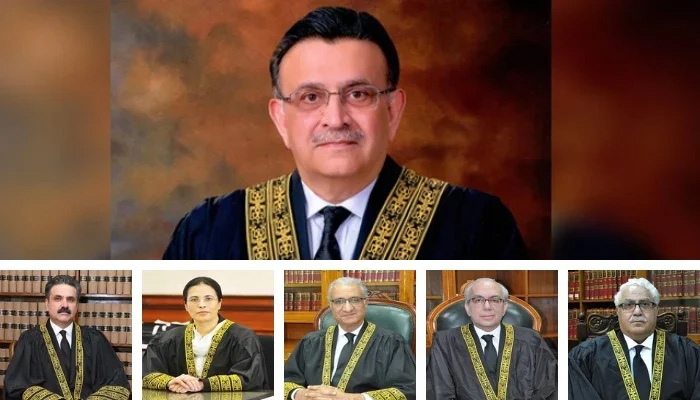Army Act applies to 'specific class', not all: CJP Bandial
SC adjourns hearing of petitions against military trials, giving AGP two days time to seek govt's directives on Army Act
ISLAMABAD: Chief Justice of Pakistan (CJP) Umar Ata Bandial on Wednesday directed Attorney General of Pakistan (AGP) Mansoor Usman Awan to seek the government's directives on Pakistan Army Act 1952, saying that "the Army Act does not apply to all".
The law applied to a "specific class", CJP Bandial said during the hearing of a set of pleas against trials of citizens under military rules.
A six-member bench, headed by the top judge and comprising Justice Ijazul Ahsan, Justice Yahya Afridi, Justice Munib Akhtar, Justice Mazahir Ali Akbar Naqvi, and Justice Ayesha A Malik, resumed the proceedings on the constitutional petitions this morning.
During the hearing, AGP Awan opened his arguments with the details about the losses incurred during the violent protests of May 9, once again requesting the court to form a full bench to hear the matter.
Meanwhile, CJP Bandial inquired which sections were applied in the cases linked with the May 9 protests.
At this, the attorney general informed the court that Section 302 of the Pakistan Penal Code (PPC) has also been included in the cases as the accused's offences were not civil nature.
Justice Naqvi then asked if any army official died amid protests.
Responding to the query, AGP Awan said there were no such reports.
When asked how this section was included when no deaths of army officials were reported, the official said he wasn't giving arguments on the matter as per orders.
At this, CJP Bandial also ordered the AGP to seek directives on this issue.
Later, the court adjourned the hearing till 9:30am on Friday, giving Awan two days to get directives from the government.
The petitions
Following the arrests made in connection with the violent riots that erupted across the country on May 9, the government announced its decision to hold military court trials of those found guilty of damaging and attacking military installments — a move both the government and the army considered a low blow.
In light of this decision, PTI Chairman Imran Khan, former chief justice Jawwad S Khawaja, legal expert Aitzaz Ahsan, and five civil society members, including Piler Executive Director Karamat Ali, requested the apex court to declare the military trials "unconstitutional".
In this petition filed through his lawyer, the former CJP Khawaja pleaded that Section 2(1)(d)(i) and (ii) of the Pakistan Army Act were inconsistent with the fundamental rights granted by the Constitution and should be struck down.
Moreover, five members of civil society from different cities — represented by Faisal Siddiqi — appealed to the apex court to declare illegal the trial of civilians in the military courts.
Similarly, Ahsan's petition challenged the government's decision to try civilians in military courts.
-
Security forces gun down 30 terrorists in multiple IBOs in KP: ISPR
-
MQM-P calls for new province in Sindh
-
US report validates Pakistan military edge over India: PM
-
Banned TTP poses serious threat to Pakistan security: UNSC panel
-
CM Afridi clarifies remarks on by-poll after ECP requests army deployment
-
Dubai sees 3.2m Pakistani passengers in 2025 as airport sets new milestone
-
Security forces kill 23 Indian proxy terrorists in KP's Kurram
-
Pakistan to construct island to boost oil exploration: report












